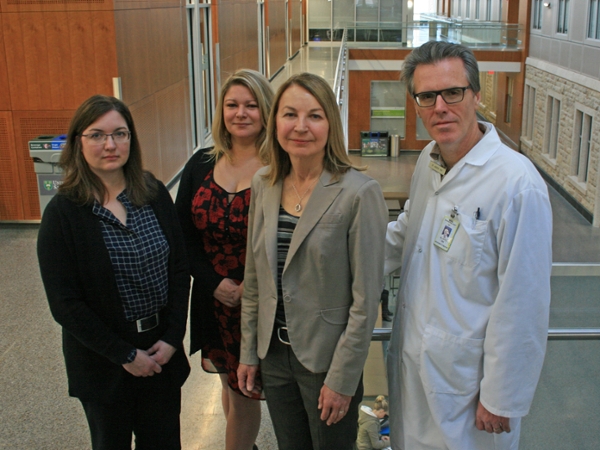
CIHR grant focuses on rural dementia care
$2.3 million grant is funding research to improve dementia resources for rural health care providers
By Marg SheridanAn estimated 47 million people across the globe live with dementia, and in rural and remote communities primary health care (PHC) providers shoulder most of responsibility for diagnoses and management with few dementia-specific resources.
It’s a problem that Dr. Debra Morgan has been researching since 1999, and a new $2.3 million Foundation Grant from the Canadian Institutes of Health Research (CIHR) will give her and her team a significant boost.
“Rural regions have fewer resources, and they have more older people,” Morgan explained. “So there are more people at risk for dementia, but there are fewer supports in the community: fewer specialists to help with the diagnostic process, fewer services for dementia like home care and respite, and physicians have less access to education to help them diagnose and manage it.”
The lack of overall resources for primary health care teams and services that are limited in both quantity and appropriateness are key reasons behind the need for this research according to Morgan.
“There are principles of dementia care for primary health care settings that are identified with better outcomes for people with dementia and their caregivers, but they mostly come from urban settings,” Morgan continued. “And we don’t know how to operationalize those principles in rural settings - how do we provide coordinated care, how do we provide education and support to patients and caregivers?
“So what we’re trying to do is take those principles and figure out the strategies to do them in rural settings that are different from the settings where they were developed.”
The CIHR grant, which is distributed over seven years, will help the team improve on their existing Rural Dementia Action Research (RaDAR) PHC Toolkit to make it adaptable, scalable, and sustainable across diverse, low-resource rural settings both nationally and internationally.
But it’s not just a matter of compiling the research and best practices for diagnosis and treatment – the burden will still fall on rural PHC providers. The ReSPECT project led by Dr. Megan O’Connell, Associate Professor of Psychology, aims to increase dementia related knowledge of rural primary care providers with a focus on remotely delivered education that changes clinical practice.
“Education on its own, however, is not sufficient,” explained O’Connell, a clinical neuropsychologist at the Rural and Remote Memory Clinic. “We will also explore novel uses of technology to allow dementia specialists to remotely support primary care providers in diagnosing and caring for rural patients with dementia without having to refer typical cases for traditional face-to-face specialist consultation.”
Because of how community-focused the research is, developing partnerships with health care providers in each community is a critical step in developing interventions with them, and if there’s a lot of turnover it can be challenging to maintain the necessary engagement.
“We’re using an adaptation model where we work very closely with the local health providers to figure out which parts of that intervention need to be adapted to work in the local context,” Morgan continued. “One example is having an interdisciplinary team where all the team members are involved in the (process). And in the rural communities that we’re working in now they actually have a lot of interdisciplinary team members, but they’re not all located in the same town and in the same office. So what we’re trying to work out is how they can work as a team around dementia diagnosis and management.”
The Foundation research stream that Dr. Julie Kosteniuk is leading is specifically intended to help address that particular issue.
“(We’re) adapting electronic decision support tools for health care providers in primary care,” explained Kosteniuk, a professional research associate with the Canadian Centre for Health and Safety in Agriculture (CCSHA) who is working with Morgan on RaDAR. “These are visit flow sheets that health care providers consult right at the point of patient care, embedded in the electronic medical record system.”
The flow sheets can help to link various providers by allowing occupational therapists, nurse practitioners, physicians and home care nurses to fill out their sections regardless of where they see the patient. The flexibility of the RaDAR PHC Toolkit means it will eventually be tested both across Canada and internationally.
“We know that there’s a lot of variability in rural communities and rural teams, so it’s a continuous adaptation in figuring out what works, where and why,” Morgan stressed. “And that will lead to the invention of different ways of doing things like team care, collaborative care, and providing patient support and education.”
